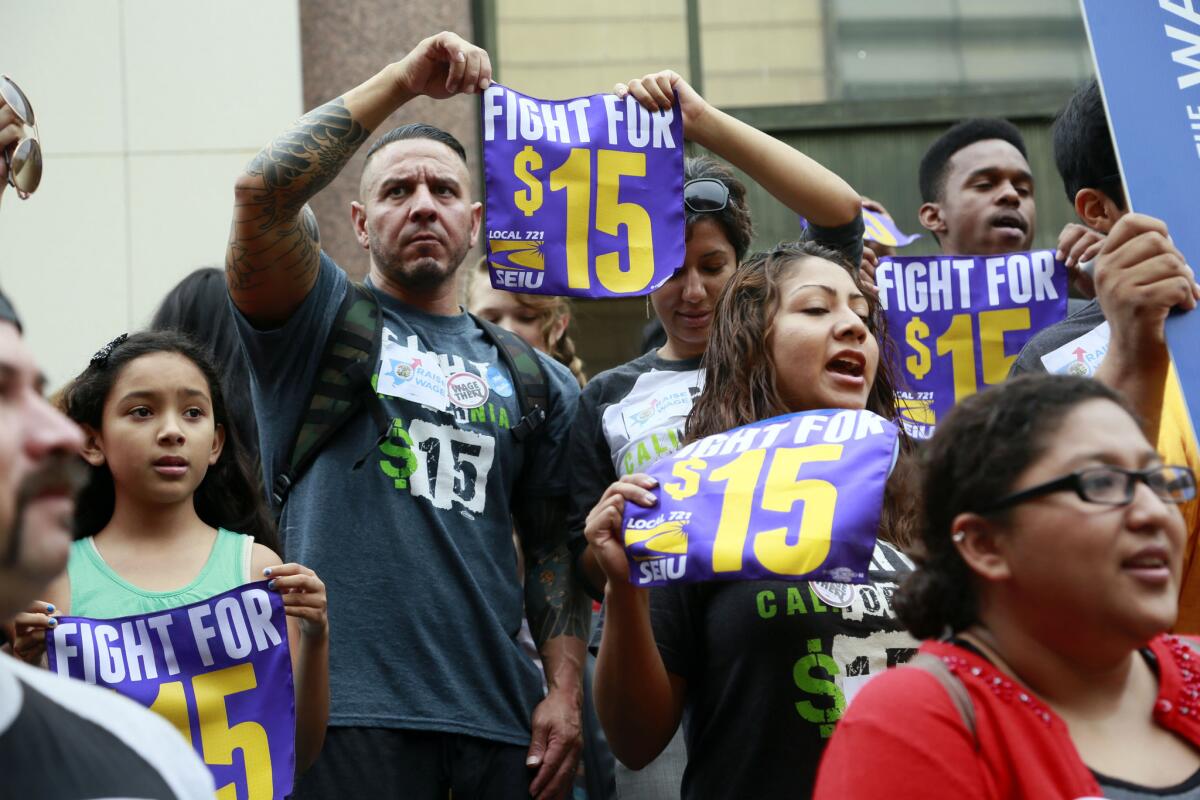Minimum-wage deal heads to Legislature for vote after clearing first hurdle

Workers last July rally in Los Angeles in support of raising the minimum wage.
The Legislature on Thursday could approve a wide-ranging package that would increase California’s minimum wage to $15 an hour over the next six years, following the measure’s first — and only — public hearing.
The plan sailed out of committee with broad support from Democrats, and is scheduled for a floor vote in the Assembly on Thursday morning.
State Sen. Mark Leno (D-San Francisco), the bill’s author, said in an interview he expects the Senate to immediately consider the plan, assuming it passes the Assembly, with an eye toward sending the bill to Gov. Jerry Brown on Thursday. The bill is expected to have an easier time in the Senate, and Leno was confident about its ultimate support in the Assembly.
“It looks like we have a more than sufficient majority vote on the Assembly side,” Leno said.
The deal, which Brown announced Monday, was praised by Democrats on the Assembly Appropriations Committee as a way to raise the standard of living for millions of Californians. The bill passed by voice vote, meaning no support or opposition was formally tallied.
Proponents of the agreement said it would also include enough safeguards to ensure that businesses and state government wouldn’t be overwhelmed by the wage hike in case of an economic downturn.
“This bill will lift people out of poverty,” Leno said when presenting his measure Wednesday to the panel.
Opponents of the bill including the California Chamber of Commerce, the California Restaurant Assn. and GOP Assembly members told the committee Wednesday that the package was too rushed, didn’t take into account different economic conditions across the state and failed to consider the wage pressures on large and small businesses. Concerns about the bill’s long-term effects also caused Assemblyman Tom Daly of Anaheim to formally oppose the package, the lone Democrat to do so.
Under the plan, the state’s hourly minimum wage would increase 50 cents from its current $10 on Jan. 1, to $11 the following year, and then increase by $1 annually until 2022 — though Brown and his successor could delay the increases by a year if the economy falters. Businesses with fewer than 26 employees would get an additional year to comply. Then, the minimum wage would increase annually based on inflation.
Brown negotiated the package after two labor unions gathered signatures for November ballot measures that would increase the wage on a more aggressive timetable. The governor touted his plan as a compromise that can be adjusted for changing economic conditions. The labor groups have said they would pull their ballot measures if the deal passes.
During Wednesday’s hearing, there was broad agreement that the package would affect the state’s economy for years to come, but significant differences remained over whether the impact would be good or bad.
Economists from UC Berkeley testified that the plan would give 5.6 million workers higher pay without resulting in any net job losses. GOP lawmakers and business groups argued that the state is still trying to measure the effects of the last minimum wage hike in 2013, and the plan could force businesses to lay off workers and replace low-wage jobs with machines.
“The ultimate minimum wage is not something we control,” said Assemblyman Jay Obernolte (R-Big Bear Lake). “The ultimate minimum wage is zero, and that’s what you make if your job no longer exists.”
The divide along party lines was expected. But the opposition from Daly could point to a possible hiccup.
Daly said he was worried about the automatic cost-of-living increases starting after the wage reaches $15 an hour.
“I believe that the authority of raising the minimum wage should remain with the Legislature and governor,” Daly said during the committee hearing. He declined further comment afterward.
Daly is the first Democrat to publicly oppose the deal. But his colleagues in a business-aligned group of Democrats have shared similar concerns in recent days about the cost-of-living increases and the effects of the wage hike on nonprofit organizations’ ability to pay their employees.
Assuming all Republicans in the Assembly vote against the plan, at least 10 Democrats would have to oppose the bill to defeat it.
Legislators spoke to a packed committee room filled primarily with supporters of the plan, including minimum-wage workers — many wearing shirts with the Service Employees International Union logo — who testified that an increase would help them pay back debts and boost their quality of life.
Beyond the impact on low-earning workers, an increase to the minimum wage will have ripple effects on the state budget and throughout the economy. The state Department of Finance estimated that the wage hike would cost $3.6 billion annually by 2023, primarily due to a pay boost for in-home healthcare workers in the public sector.
Many other salaries are tied to the minimum wage, which could also result in raises for those employees. Teachers, for instance, need to earn double the minimum wage or receive overtime pay because of state rules governing employees who are exempt from overtime.
Assemblywoman Lorena Gonzalez (D-San Diego), the chairwoman of the appropriations committee, said the wage increase would address one consequence of a minimum wage that hasn’t kept pace with cost of living: government subsidies for low-wage workers.
“We have a situation by which even with a full-time job they’re relying on food stamps and public housing and free lunch programs,” Gonzalez said. “We are subsidizing all of these businesses who are not providing enough for people to live on.”
Follow @dillonliam on Twitter
Times staff writer Patrick McGreevy contributed to this report.
ALSO:
Gov. Brown hails deal to raise minimum wage to $15 as ‘matter of economic justice’
Timeline of minimum wage increases in California
Who wins with a $15 minimum wage?
Your voices: How would a minimum wage impact you?
More to Read
Get the L.A. Times Politics newsletter
Deeply reported insights into legislation, politics and policy from Sacramento, Washington and beyond. In your inbox three times per week.
You may occasionally receive promotional content from the Los Angeles Times.







